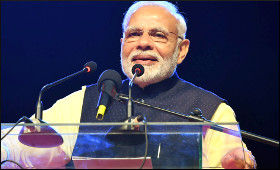|
|
|

|
'Jan Dhan scheme speedily narrows banking gap in India, empowers women'
|
|

|
|
| Top Stories |
 |
|
|
|
IANS | 18 May, 2023
India has dealt with the problem of unbanked adults effectively as it
has managed to get opened over 489.3 million new banking accounts in the
past eight to nine years.
Interestingly, 56 per cent of
these beneficiaries are women while 67 per cent are from rural and
semi-urban areas. The scheme, named PM Jan Dhan Yojana (PMJDY), has
helped the Government of India make inroads in rural areas and bring
underprivileged sections of society under the banking net.
The
PMJDY was launched in September 2014. The financial inclusion mission
received a huge response from across the country, thanks to favourable
terms and conditions and extensive benefits. Thousands of people
thronged to different banks to open saving accounts under the scheme
that transformed the banking sector in India. It made it to the Guinness
World Records for facilitating the opening of over 18 million accounts
in just a week.
The Jan Dhan accounts held over Rs 1.98 trillion (roughly $24 billion) in May 2023.
These
accounts are linked to several social welfare schemes. The Government
of India has succeeded in reaching out to the poorest of the poor,
especially during disasters. The PMJDY bank accounts proved very helpful
when Covid-19 pandemic induced lockdowns forced people to stay indoors,
which caused loss of livelihoods. The government released funds worth
Rs 6.8 billion (roughly $8.3 million) in the PMJDY accounts. This
allowed the Covid-affected, poor and vulnerable people to buy essential
commodities and services.
The scheme has been a landmark
achievement as it led to the comprehensive financial inclusion of almost
every household in India. Financial literacy, plugging in leakages,
access to credit, women empowerment, and extending services of insurance
and pension to vulnerable communities are among the major benefits of
the PMJDY.
There is no fee for opening a bank account under the
PMJDY while accident insurance cover is provided free of cost. There is
no requirement to maintain a minimum balance either.
Washington-based Brookings Institution had said that the PMJDY has had a "considerable impact" in expanding financial access.
"The
PMJDY programme has certainly helped drive access to formal financial
services across India and amplified the discourse surrounding financial
inclusion among public and private sector stakeholders," it said in its
2016 report.
In 2014, India used to be one of the top most
unbanked countries globally. However, the PMJDY changed the scenario.
The percentage of bank account holders rose from 35 per cent in 2011 to
78 per cent in 2021, according to the World Bank.
"Much of that
growth occurred between 2014 and 2017 as a result of a government
programme that began in 2014 and provided unbanked adults with a
financial account leveraging an official government identification
document," revealed a World Bank report of 2021.
Inclusion of
women from poor backgrounds and rural areas in the banking services is a
very important aspect of the PMJDY. Globally, the majority of unbanked
adults are women. Non-profit Women's World Banking stated that women
cannot exercise their rights if they do not have access to financial
services.
It also praised India for a "huge amount" of success in the last-mile delivery of banking services to underserved communities.
"While
many of these women are actively using their PMJDY accounts, they are
doing so only to access the benefit transfers they receive from
government initiatives, which means that they are simply cashing out
their benefits," it said.
The global non-profit, which was formed
after the first-ever UN Women's Conference on human rights in 1975, has
collaborated with Indian banks to encourage women to save money in
their PMJDY accounts. This would help build financial resilience for
women and economic resilience in India, it said in its report on �The
Power of Jan Dhan.'
Access to banking through PMJDY has allowed
Indian women to save money they get from different sources. The report
revealed that the average balance maintained by women was 30 per cent
more than that by men. It reflected how the PMJDY is contributing to
women's empowerment.
Women's World Banking Executive VP (Asia)
Sriraman Jagannath said, "We are blessed to have a platform like the Jan
Dhan Yojana, which can be the world's largest women's empowerment
opportunity."
|
|
|
| |
|
|
|
|
|
|
|
|
|
|
|
|
|
|
| |
| Customs Exchange Rates |
| Currency |
Import |
Export |
US Dollar
|
84.35
|
82.60 |
UK Pound
|
106.35
|
102.90 |
Euro
|
92.50
|
89.35 |
| Japanese
Yen |
55.05 |
53.40 |
| As on 12 Oct, 2024 |
|
|
| Daily Poll |
 |
 |
| Do you think Indian businesses will be negatively affected by Trump's America First Policy? |
|
|
|
|
|
| Commented Stories |
 |
|
|
|
|
|
| |
|